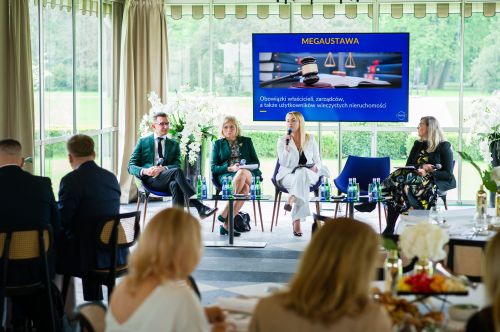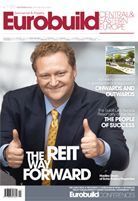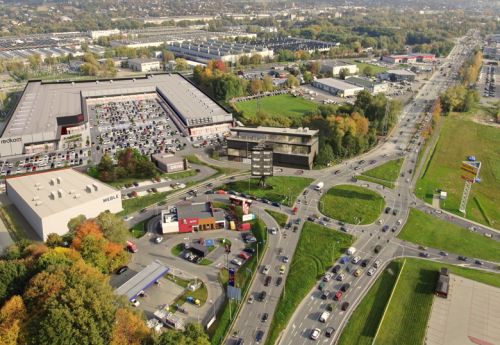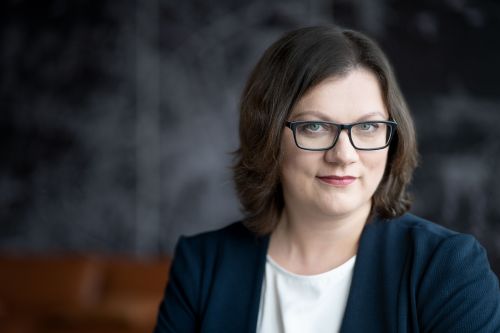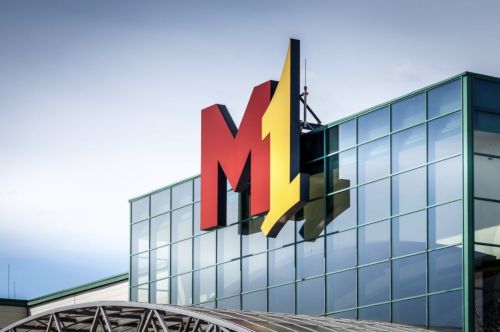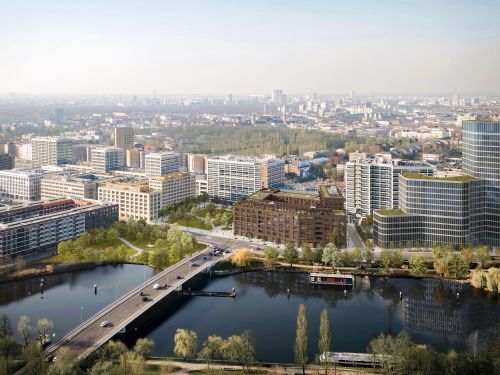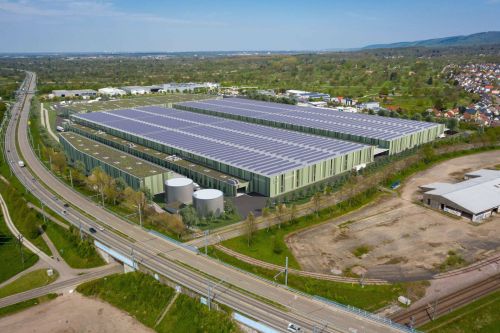The maker of miracles
Feature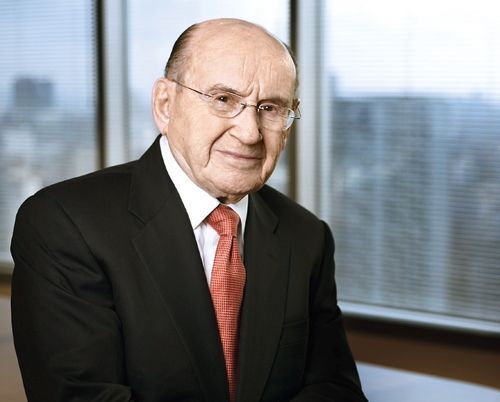
David Mitzner was born into a Jewish family in Warsaw in 1915, the eldest of four children. He grew up in a building at ul. Miła 28, in the city’s Muranów district. While “Miła” means “lovely” in Polish, according to his memoirs in those days it was anything but: a crowded slum in the city’s Jewish quarter where people struggled to make a living. Nevertheless, the family’s clothing business thrived in the interwar years and the Mitzners were able to move to the more upmarket ul. Gęsia 13. The young David increasingly gave up his studies as he became more involved in the business, spending much of his time in Lwów (now Lviv in Ukraine) at the family’s Warsaw Hosiery Factory [Warszawska Fabryka Trykotazy]. It was here he found himself at the outbreak of World War II as the rest of his family remained back in Warsaw, which under the Nazi-Soviet Pact fell under German control. Lwów, however, was in the region annexed by the USSR. In the year that followed, David became involved in the dangerous activity of smuggling goods between the two divided parts of Poland – to help his family and others to survive the occupation. After many close calls he was eventually caught in the act by the Soviet authorities and dispatched to the gulag – an event, ironically, that saved his life. Erroneously classified as a German and charged with being an enemy alien, rather than as a smuggler, he was prevented from being selected for Anders’ army and being sent to the front.
David Mitzner regards his survival of the war, nevertheless, as a series of miracles – in Hebrew the ‘nesim’ referred to in the title of his memoirs. In the gulag his business skills were also evident and life-saving, as he traded cigarettes for food. After his release in 1949, he managed to escape from Russia back to Poland, but found Warsaw in ruins and his family home utterly destroyed. The rest of his family had not been as fortunate as he was: only his sister Rozia survived the Holocaust (they were later reunited in Canada). With nothing left for him in communist Poland, he decided to leave for America, with the help of his uncle. But to do so without a visa he had to smuggle himself out to Sweden first, as a stowaway. Once in Sweden, the second part of his plan involved obtaining a visa by posing as a rabbi using forged documents. The ruse eventually worked and he finally landed in New York in April 1949, with just 17 dollars in his pocket. Starting again from the bottom, he worked for a number of hosiery companies before saving up enough money to start his own: Rida (named from the initials of Ruth, Ira, David and Jacob – family names of the Mitzners). While the business, which was later relocated to Houston, was successful it was still subject to the whims of fashion – and so he eventually opted to move into a more predictable field of activity: real estate. A number of acquisitions of shopping centres in the American south followed in the early 1970s, leading up to the company’s major investment: the development of the Champions-Gate hotel complex close to Disney World in Florida, which started in 2001. It was Rida Development’s activities in Florida that led to its association with Apollo Real Estate.
However, in the 80s the company had begun “to drift”, according to David Mitzner. He had also never taken his eye off his home country and so decided to look for new challenges in Poland, returning for an emotional first visit in 1986. Several fruitless trips to find the right properties to invest in followed, each time thwarted by bureaucracy and the general lack of legal clarity. It took until after the political transformation, in 1993, when he was on the verge of giving up on the idea of investing in Poland altogether, for the right opportunity to finally come along. He was told of the state auction of the former ZRK radio station on ul. Kasprzaka in Warsaw’s Wola district and jumped at the chance, beating off rival bids to purchase the property for more than USD 6 mln. The buildings have since been converted into the PAR Tower and Renaissance Plaza office buildings, and count among their tenants such giants as Eriksson. The investment paid off in less than three years, confirming to the many doubters that Polish real estate was indeed a profitable enterprise. Apollo-Rida, the partnership co-founded by David Mitzner for Polish property investment, then bought a neighbouring plot to develop Renaissance Tower, later sold to Heitman for around EUR 53 mln. In 2002 the company made an even greater splash on the market, with the purchase of the then failing Warsaw Trade Tower skyscraper for EUR 83 mln, financed by Euro-Hypo. Another major achievement was the acquisition of a former abattoir complex in Żerań district for the development of the first warehousing park inside the city (Żerań Park). And then in 2004 came the biggest deal in Polish real estate history: the EUR 700 mln transaction to buy 28 shopping centres across the country from Metro Group – a deal sealed with a handshake after a chance meeting in a café in the Warsaw Marriott. It was this talent for negotiating and seizing the right opportunity that distinguished him among the players who have come to this country – and his importance to the successful development of the Polish real estate market cannot be underestimated.
Ben Bannatyne
president, Prologis Europe
A true gentleman
Imet David almost 20 years ago when I first moved to Warsaw, in November 1997, to work with Jones Lang Wootton. I knew immediately that he was going to be quite a character. Within a matter of weeks, David, his son Ira, Rafał Nowicki and I were on site at the Żerań Meat factory (a horrible old communist era abattoir) being given a tour. This was David’s latest brainchild and he was very excitedly explaining his vision for how he would turn this into a modern logistics and business park only a few miles from the centre of Warsaw. At this point I thought he had to be nuts. However, David followed through with his vision and delivered Apollo Rida’s first warehouse and logistics park in Poland. Fifteen years later I acquired this very successful warehouse park on behalf of Prologis. David was a visionary, who was not afraid of risk and achieved great success in both Poland and the US. More importantly, he was always a true gentleman and someone I will always remember and look up to from my time spent in Poland.
Markus Leininger
principal, Simres Real Estate
Golden handshake
David Mitzner and I met by coincidence. My assistant sent a fax to the wrong number and, as a result, I received a phone call from a stranger asking me when I would next be in Warsaw. That stranger was David Mitzner. I didn’t know David and I didn’t have a trip planned to Warsaw at that time. However, two days later David arrived in Frankfurt to meet me at my office. He wanted to share with me the projects he was working on and to see how we could together arrange the necessary financing. A couple of years later, David handed over control of his business to his son Ira. At that time Rida Development and its strategic business partners were one of my firm’s top ten clients globally. Our business relationship was one driven by a high level of professionalism, respect and Mitzner’s well-known “handshake“ approach – an approach that over the years has become lost to the real estate industry. David was a man of his word and he expected this in return from his business partners. He was a character, with a personal experience without comparison. When he released his biography I had the opportunity to truly appreciate all he had experienced during his life – and I couldn’t help but be impressed. David, my friendship with you started by accident, but turned out to make a lasting impression on my life. We miss you and it was so true that nesim were all around you. [Editor’s note – from the title of David Mitzner’s autobiography, ‘nesim’ being Hebrew for ‘miracles’]
Tomasz Trzósło
managing director JLL in Poland
Irreplacable intuition – and affection
Imet David Mitzner on many occasions and it was an interesting experience every time. For example my first investment project at JLL – the sale of 50 pct of a skyscraper on ul. Chałubińskiego in Warsaw. An American fund was one of the interested buyers. Its large group of analysts built a financial model for this purchase, asking a lot of questions and verifying dozens of documents in the process. After four weeks of intensive work and detailed analyses the fund established the purchase price as X. The building was viewed by David Mitzner at that time, as Apollo Rida was also interested in the purchase. We had been walking around the tower for about 30 minutes, and it also needs to be said that Apollo Rida had not received any information at that point apart from a two-page document with just a few pictures. After 30 minutes David took me aside and said: “Mr Trzósło, I don’t like the price you are offering. I’ve had a look at the building and we can give you, let me think... we can give you X and not a penny more.” The amount quoted by David was virtually identical to the figure arrived at from four weeks of analysis by the rival fund. Well, you need to have intuition in real estate and no financial model can replace it. It was a beautiful moment for me and Mr Mitzner.
I also remember a meeting at which JLL applied for a contract to sell an office project owned by Apollo Rida. Gareth Jones and myself gave a 45-minute presentation. David listened carefully, did not comment on anything and finally looked at Gareth and said: “I don’t like you. I like Ben.” He meant Ben Bannatyne, who was the head of our warehouse lease department at that time. So we left the meeting convinced that we would not get the project. However, we were mistaken – David’s affection for Ben turned out to be so strong that we won that contract. It turned out that David also had some affection for Gareth and myself, but of course, it was not as strong as for Ben.
Rafał Nowicki
CEO Europe, Apollo-Rida Poland
Open to all
Ihad the honour of knowing David since the mid-1990s. In fact, I spent most of my professional career working by his side. He had an unbelievable instinct for identifying good opportunities and once something caught his interest he would pursue it with the persistency and energy of a teenager. Perhaps not everyone realizes that when he established Apollo-Rida in Poland he was well into his 70s. At this age most people are already enjoying their retirement. For him it was just the opening of a new chapter of an already very rich business career, which continued for almost another quarter of a century. He marked a number of milestones in the development of Polish real estate and we will remember him as a true legend and visionary. Those who met him will remember him for his personal charm and welcoming and positive attitude. His doors were wide open to everyone and it is amusing how many people were coming to see him each day. There was always someone in his office pitching new business, seeking advice, looking for a charity donation or simply coming in for a chat. He was a Varsovian and a Polish patriot by birth and by heart and so proud of being able to contribute to the country’s rebirth. I do not recall him happier than the day his efforts were recognised with the Order of Polonia Restituta.
Dear Mr Mitzner, you will be missed.
Andrzej Tokaj
senior partner, Magnusson
A figure of global stature
Ihad the pleasure and honour to know David Mitzner and work closely with him for twenty years. I often wondered, like many others who knew him, about the source of his inexhaustible energy, vitality and courage, which enabled him to start things from scratch so many times. He first started before the war, when he helped his father in his business and gradually became more and more independent; the second time he had to start over was when he had to adjust to camp life in the gulag for seven years – a long enough period to have built a prominent position and a respectable career today. From his memories of the camp, I recall that the basic condition for survival was not smoking. This general truth grew into a life saver. Free from this addiction, David could trade cigarettes for food. He remembered that people who were stronger than him, looked healthier and were more resistant tended to break down from malnutrition like matchsticks after a few months of servitude. He started again in America, completely from scratch again, alone and with a dozen or so dollars in his pocket. Finally his next beginning took place in Warsaw in the 1990s, which he undertook when he was almost eighty years old. It also involved beginning from scratch, in a place and environment that had changed completely in the 50 years of his absence. Every new beginning bore fruit in the form of astonishing success as measured against the given reality, whether the point was to survive or to provide a good life, education and development for his family, or ultimately in becoming an icon and patron thanks to his work, endurance, ideas and knowledge, while being a pioneer in the development of the Polish market. I have now come to the conclusion that the source of his professional excellence was his deeply rooted awareness that large and complicated business is done by institutions but CREATED by people, a belief that he practised everyday in a way. This is why the personal dimension of a relationship must be the basis of each successful enterprise; it’s why it is important to build trust, partnership and loyalty. David Mitzner’s life, his successes and his fortunes led him to the front page of The Washington Post and won him numerous distinctions and awards; they made him into a man with a global stature. He was deeply attached to Warsaw and told me only a few months before his death that he felt best in here and was preparing to come back. Warsaw, which owes so much to him, is now emptier without him. I think that Warsaw will – in the same way as the people who knew, respected and even loved him – fill the emptiness he leaves behind with their memories of him.












